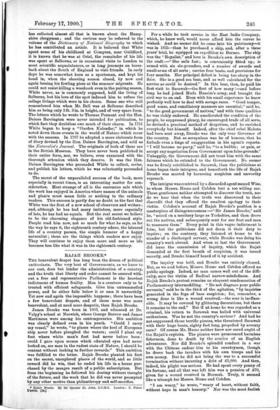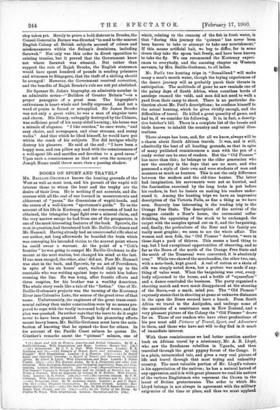RAJAH BROOKE.*
THE benevolent despot has long been the dream of political enthusiasts. The very best of Governments, as we know to our cost, does but hinder the administration of a country, and the truth that liberty and order cannot be assured with- out a free and representative Parliament is the heaviest indictment of human frailty. Man is a creature only to be trusted with efficient safeguards. Give him untrammelled power, and he either falls below it or uses it unworthily. Yet now and again the impossible happens ; there have been a few benevolent despots, and of these none was more benevolent, and at need more despotic, than Rajah Brooke.
James Brooke was born in 1803, and educated at Dr. Valpy's school at Norwich, where George Borrow and James Martineau were among his contemporaries. His ambition was clearly defined even in his youth. " Could I carry my vessel," he wrote, " to places where the keel of European ship never before ploughed the waters ; could I plant my foot where white man's foot had never before been ; could I gaze upon scenes which educated eyes had never looked on, see man in the rudest state of Nature, I should be content without looking to further rewards." This ambition was fulfilled to the letter. Rajah Brooke planted his foot on the secret, unexplored places of the world, and so little reward did he win, that he ended his life in a house pur- chased by the meagre result of a public subscription. But from the beginning he followed his destiny without thought of the future, and the work that he did was never prompted by any other motive than philanthropy and self-sacrifice.
• Rajah Brooke. By Sir Spenser St. John, G.C.M.G. London : T. Fisher truwIn. Crel
For a while he took service in the East India Company, which, he knew well, would never afford him the career he wished. And no sooner did he come into his patrimony—it was in 1835—than he purchased a ship, and, after a three years' trial, he equipped an expedition to Borneo. The ship was the "Royalist," and here is Brooke's own description of the craft:—" She sails fast; is conveniently fitted up ; is armed with six six-pounders, and a number of swords and small-arms of all sorts ; carries four boats, and provisions for four months. Her principal defect is being too sharp in the floor. She is a good sea boat, and as well calculated for the service as could be desired." In this boat, then, he paid his first visit to Sarawak—the first of how many !—and before long he had joined Dinda Hassim's army, and brought the civil war to an end. Even with his small experience he knew perfectly well how to deal with savage races. " Good temper, good sense, and conciliatory manners are essential," said he, " to the good government of natives," and with these qualities he was richly endowed. He ameliorated the condition of the people, he suppressed piracy, he encouraged trade of all sorts, he devised a practical method of despotism, and he enriched everybody but himself. Indeed, after the chief rebel Makota had been sent away, Brooke was the only true Governor of the country. But so scrupulous was he of honour, that he forbade even a tinge of exaggeration in his agent's reports. "I will become no party," said he, "to a bubble; or gain, or accept any negotiation from Government upon false grounds." Unhappily, the Government did not treat him with the same fairness which he extended to the Government. No sooner was he firmly established in Sarawak, than the politicians at home began their intrigues, and henceforth the life of Rajah Brooke was marred by harassing suspicion and unworthy reproach.
The intrigue was contrived by a discarded agent named Wise, to whom Messrs. Hume and Cobden lent a too willing ear. These gentlemen neither attempted to discover the truth, not do we hear that when the truth was discovered to their discredit that they offered the smallest apology to their victim. Cobden's account of Rajah Brooke's position is a masterpiece of disingenuousness :—" Sir James Brooke," said he, "seized on a territory large as Yorkshire, and then drove out the natives, and subsequently sent for our fleet and men to massacre them." Every point in this vague indictment is false, but the politicians did not deem it their duty to inquire ; on the contrary, they listened at home to the slander of a discharged servant, while Brooke was doing his country's work abroad. And when at last the Government did issue the commission of inquiry, which the Rajab demanded at the first breath of suspicion, it was issued secretly, and Brooke himself heard of it by accident.
The inquiry was held, and Brooke was entirely cleared. But, as we said before, Messrs. Hume and Cobden offered no public apology. Indeed, no man comes well out of the diffi- culty, save the victim of Radical narrow-mindedness. And Rajah Brooke's protest remains an eloquent condemnation of Parliamentary intermeddling. " Do not disgrace your public servants," said he in the thick of the agitation, " by inquiries generated in the fogs of base suspicion ; for, remember, a wrong done is like a wound received,—the scar is inefface- able. It may be covered by glittering decorations, but there it remains to the end." But if at home he was regarded as a criminal, his return to Sarawak was hailed with universal enthusiasm. Was he not the country's saviour ? And had he not suppressed those terrific pirates, who threatened Sarawak with their huge boats, eighty feet long, propelled by seventy oars ? Of course Mr. Hume neither knew nor cared aught of the Rajah's exploits. The pirates were pronounced harmless fishermen, done to death by the avarice of an English adventurer. Nor did Brooke's splendid conduct in a war with the Chinese endear him to his countrymen, though he drove back the invaders with his own troops and his own money. But he did not bring the war to a successful termination without incurring a debt of £5,000. And then, indeed, his plight was serious. He had spent every penny of his fortune, and all that was left him was a pension of £70, given for a wound received in Burmah. Truly, it seemed like a triumph for Messrs. Hume and Cobden.
"I am weary," he wrote, "weary of heart, without faith, without hope in man's honesty." Nor was the most foolish step taken yet. Merely to prove a bold distrust in Brooke, the Consul-General in Borneo was directed "to send to the nearest English Colony all British subjects accused of crimes and misdemeanours within the Sultan's dominions, including Sarawak." Not only was this order in direct opposition to existing treaties, but it proved that the Government knew not where Sarawak was situated. But rather than support the rule of Rajah Brooke, the English statesman would have spent hundred of pounds in sending prisoners and witnesses to Singapore, that the theft of a shilling should be avenged ! However, the Government received correction, and the benefits of Rajah Brooke's rule are not yet abolished.
Sir Spenser St. John's biography, an admirable number in an admirable series—" Builders of Greater Britain "—is a proper panegyric of a great man. The biographer's enthusiasm is heart-whole and loudly expressed. And not a word of praise is forced or misapplied. Sir James Brooke was not only a great ruler, he was a man of singular taste and charm. His library, unhappily destroyed by the Chinese, was sufficient proof of his many-sided learning ; his house was a miracle of elegance. "I like conches," he once wrote, "and easy chairs, and newspapers, and clear streams, and sunny walks." And that which he liked himself, he would have put within the reach of his subjects. Nor did intrigue wholly destroy his pleasure. He said at the end : " I have been a happy man, and can pillow my head with the consciousness of a well-spent life and sacrifice and devotion to a good cause!' Upon such a consciousness as that not even the memory of Joseph Hume could throw more than a passing shadow.







































 Previous page
Previous page